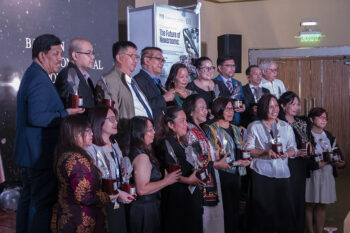(Speech of Governor Mujiv Hataman of the Autonomous Region in Muslim Mindanao during the dinner the ARMM hosted for participants in the Global Autonomy, Governance and Federalism Forum on 19 October 2016 at Dusit Thani hotel in Makati City. This speech was read for him by ARMM Executive Secretary Laisa Alamia)
First of all, I would like to welcome everyone to our fellowship dinner tonight. I would also like to congratulate the Institute for Autonomy and Governance, as well as the Konrad Adenauer Stiftung and the Australian Government, for organizing this Global Autonomy, Governance, and Federalism Forum.
In a world where boundaries both real and imaginary are either built or broken down, there will always be a need to come together and form communities where people can learn from each other’s differences and share common goals. Today, we have formed one such community, and I’m sure we all look forward to learning more from each other.
Good conversations about autonomy, federalism, and governance, have been shared today. The diverse people and different perspectives we’ve seen and heard so far reminds us that, while we share across nations common principles regarding autonomy and federalism, there is no one-size-fits-all approach to governance. Hence it is important that we constantly listen to and learn from one another.
Federalism, despite its recent resurgence in Philippine consciousness, is not a new proposition in Philippine governance. However, having a president who has made the shift to federalism a core agenda of his campaign mainstreamed the discussion, encouraging debate and elevating discourse.
This is not to say that power is not already decentralized in our country. At a time when we have just freed our nation from the clutches of Martial Law, the Local Government Code of 1991 was ratified and it was then a groundbreaking piece of legislation on Philippine governance. It empowered local governments units (LGUs) by devolving a number of functions of the national government to the LGUs and by allocating a share of the national revenue to LGUs, known as the Internal Revenue Allotment (IRA). However, while it allowed for independent initiatives at the local level, the limits of the said law became apparent as the years passed.
The Local Government Code wasn’t subjected to a comprehensive review until 2014, despite the law explicitly stating that a review must be done every five years, and it has left many legal overlaps and inconsistencies unaddressed, causing gaps in government to widen with each passing year.
The case of the Autonomous Region in Muslim Mindanao, although similar, is distinct from other regions. While it appears to enjoy more autonomy than LGUs, that appearance is far from reality. A review of signed agreements between the Philippine government and Moro revolutionary fronts shows a progression in the devolution of powers and resources from the national to the regional government. Implementing these agreements, however, has been an entirely different story.
The ARMM that was established based on the principle of self-determination and self-governance still had to depend heavily on the national government when it came to decision-making and policy implementation. Recently, the national government has expressed its intent to fully and faithfully implement these agreements – a development that was welcomed by parties to the peace process, including civil society groups and the international community.
Despite the many challenges it has faced, the autonomous region has evolved into a political unit that our people can take pride in. As a Bangsamoro born and raised in the ARMM, I have lived through years of conflict and poverty, and my experiences continue to guide my leadership as regional governor of the ARMM. Our people have faced a number of challenges, many of them unknown to the rest of the country. In turn, our region has grown to be a strong example of what strong political will can achieve, and of how autonomy can work for the people.
But our gains cannot be sustained unless we allow the true spirit of autonomy breathe life into the letter of our laws. A meaningful devolution of powers and resources and serious political reforms are necessary so that our political institutions can further evolve and better respond to our people’s needs.
We need an autonomy that goes beyond paper — one that is rooted not on personalities or partisan politics, but in our shared values and aspirations. There is also another option, and that is federalism.
For the Autonomous Region in Muslim Mindanao, the discussion on federalism is already a familiar one. At the negotiating table with the government of the Philippines, both the Moro National Liberation Front and the Moro Islamic Liberation Front have, at some point, expressed a willingness to explore federalism as a viable option in affirming its right to self-determination, while pushing for mechanisms that will ensure transitional justice.
The prospect of having the Bangsamoro as a model federal state has been brought up more than once in recent discussions related to a projected shift in the form of government.
Legislators who were once reluctant in granting our region autonomy are more open to the idea of federalism. They no longer see power sharing and decentralization as threats to nationhood, because these are no longer just possibilities for the ARMM but also for other regions as well. And in a country with people that is as diverse as ours, federalism can provide an opportunity for our differences to be a source of strength instead of causing great divides.
Our current president is willing to explore this option, and the same willingness can be felt from both houses of congress, who have expressed their intent to convene a constituent assembly. No less than the Speaker of the House of Representatives and the Senate President have expressed an intent to pass legislation towards a shift to federalism.
The Bangsamoro struggle is a response to historical injustice; a struggle that, despite a long history of armed conflict, has always been steered towards to a peaceful resolution. Part of this is making sure that our people are given the opportunity to chart their own fate through self-determination, and that healing and reconciliation are achieved through transitional justice.
Whichever gets realized first, whether it may be a new organic act for the Bangsamoro or a shift to federalism, the Autonomous Region in Muslim Mindanao is ready to take the lead. We are ready and we will continue to make a strong case for empowered local governments, whether as an autonomous region opening the doors for federalism, or as a model federal state for other regions.
We would also like to affirm, as always, our strong commitment to pursuing just and lasting peace in the Bangsamoro. Times like this remind us that government is not static structure, but a dynamic organization that evolves as it constantly adapts to the needs of its people. More than ever, platforms such as this forum are important – platforms wherein leaders and policy makers engage in conversations that help make sense of autonomy and federalism as a means to unite the people despite and because of their differences.
But apart from our leaders and legislators, it is our people whom we must always engage and converse with. We must recognize that a shift in government does not end with passing legislation, but that it is bound to be a continuous process of birth and rebirth, an act of transformation and evolution that involves our people.
Through it all, it is imperative we are constantly aware of our differences and embrace them, as we continue to build a country bound together by mutual understanding – to build a nation of people that grows together and looks at one another with respect, as we recognize our shared humanity.







